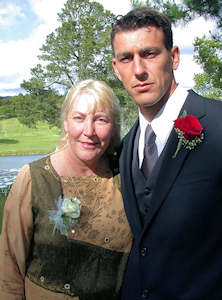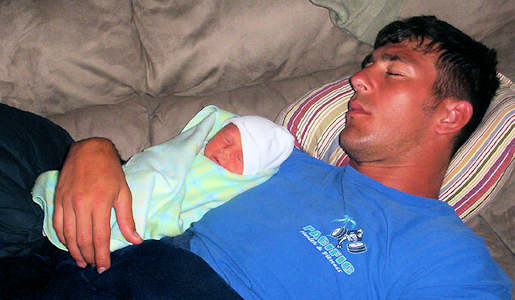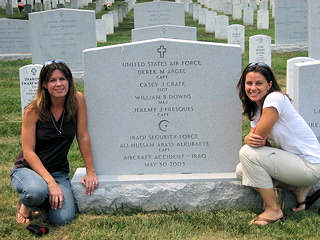More
than
850 Americans have been killed in Iraq and Afghanistan since last
Memorial
Day. For many of their loved ones, the day's meaning has been
transformed. This
Memorial Day will feel like their first.
Memorial
Day
2005: America
is at the park, in the water, around the grill. At a walleye fishing
tournament
in Dubuque, Iowa, a lawn mower race in Hillsborough, N.J.,
a techno-music festival in Detroit.
Dania Jai-Alai near Miami
offers free U.S.
flag magnets, while supplies last.
There
are
countless sack races, eating contests and tugs of war, endless sales on
everything from RVs to bikinis. All patriotic T-shirts are $5 at eight
Sears
stores in greater Phoenix,
while supplies last.
This
is how
most of us spend Memorial Day, an occasion for remembrance that
morphed,
through years of peace, into beer, ball, boats and barbecue.
|
But
three
years of war have revived the holiday's original meaning. Today, for
the
families of two young Air Force officers, the gateway to summer will
become a
portal to grief.
In
Iraq,
Derek Argel and Jeremy Fresques — both Air Force Academy
class of 2001, both
commandos, both promoted this day to captain — prepare to fly
off on a
classified mission.
In
Fort Walton Beach, Fla.,
Capt. Argel's wife, Wendy, sits down at the computer as their
10-month-old son,
Logan, plays on
the floor. She wants Derek to have an e-mail from her when he gets back.
The
television
shows scenes of parades and cemetery services. In the e-mail's subject
field,
she types, “Memorial Day.”
In
nearby Destin, Fla.,
Capt. Fresques' wife, Lindsey, also an Air Force captain, joins the
annual
“Gate to Gate” road race at Eglin Air Force Base.
She and other runners drop
carnations at the base Veterans Memorial as they jog past.
Right; Debbie Argel-Bastian and her son, Derek Argel
|
 |
In
Yuma, Ariz.,
Fresques' father, Nick, has gotten a call from his wife, Sherry, asking
him to
come home early from work. After all, it's Memorial Day. In Santa
Barbara, Calif.,
Argel's mother, Debbie, enjoys a poolside martini in her
father-in-law's
backyard.
All
are
patriotic Americans who have relatives at war. Still, for them as for
almost
everyone else, Memorial Day is 90% recreation and 10% recollection.
Before the day
is over, that will change forever.
 |
More
than a
dozen communities claim to be the birthplace of Memorial Day, including
Waterloo, N.Y., (designated as such by Congress in 1966); Columbus,
Miss.
(recognized by the Library of Congress in 1958); and Boalsburg, Pa.,
where in
1864 three women started a tradition of decorating Civil War soldiers'
graves
with flowers.
On
May 30, 1868, Union
veterans first officially observed Decoration Day. Over the next
century, a
succession of wars swelled the importance of what became known as
Memorial Day.
In
1971,
Congress divorced Memorial Day from May 30, making it the last Monday
in May.
By 2000, the day's original meaning had become so subsumed in the
festive
three-day weekend that Congress passed the national Moment of
Remembrance Act,
asking for a moment of silence at 3 p.m.
Pictured; Derek observes a moment of silence with his son, Logan
|
Years
of
peace also took their toll. For many, Memorial Day was old men walking
around
in funny hats and outfits wearing obscure ribbons and medals
— forgotten heroes
of forgotten wars.
In
Farmington, N.M.,
where Jeremy Fresques grew up, his mother mostly recalls the kids'
baseball
games and soccer tournaments. His father sums it up:
“Memorial Day was a
picnic.”
In
Lompoc, Calif.,
where Derek Argel grew up near Vandenberg Air Force Base, Memorial Day
was
different. The main street was lined with flags. Hundreds of people
gathered at
the cemetery. A clergyman read the names of the war dead, Scouts placed
a flag
on every veteran's grave and a bugler played taps.
Derek's
grandfather was a career Marine who fought in World War II.
In
the sixth
grade, Derek wrote that on Memorial Day, “We should put the
flag out at our
homes, and go to the service at the cemetery. On this day we show
respect to
the veterans who risked their lives or were killed protecting our
freedom and
flag. I am happy to see them put a little flag on my grandfather's
grave.”
In
Iraq on
Memorial Day 2005, Fresques, 26, and Argel, 28, have made captain.
However,
there's no time for a promotion ceremony. Because they're on a mission,
they're
not even wearing their new silver bars. A promotion “would
have been the last
thing on their minds,” says Col. Kenneth Rodriquez, their
group commander.
“These guys were very mission-focused.”
Only
a few
cadets from each Air Force Academy class are selected to wear the red
beret of the
Air Force's Special Tactics unit. They're called Combat Controllers, a
dry
term for shock troops trained to land in hostile territory, set up and
protect
landing fields, and direct aircraft into them.
Argel:
water polo star,
6-5, 210, 4% body fat. Wanted to go to the Air Force Academy so badly
he
attended two prep schools after high school to get in. On a whim,
entered
academy boxing tournament, having never boxed before, and made the
finals,
losing a split decision. Set so many records in commando training he
had to lug
a hunk of driftwood as handicap.
Fresques:
hard worker, deep
thinker. Considered military academies because he didn't want to get a
loan to
attend University of Arizona. Joked that he
chose Colorado Springs
over West Point because female cadets were
better looking; said the Air Force treated officers better. Found Jesus
in his
senior year at the academy. Upon seeing copy of Maxim, the men's
magazine, on
the desk of a superior officer, he said, “Sir, you aren't
going to read that,
are you?” Disqualified by eyesight for flight school, he
became a
communications officer. Applied for elite special ops unit after
deciding that
he'd “go crazy sitting at a desk.”
Argel,
a
rising star in Special Tactics, has decided to make a career of it.
Fresques plans to leave the Air Force in 2006 and possibly go into real
estate.
Both will finish their tour in a month and go home.
“I'm
definitely ready,” Fresques e-mails his parents on May 26.
Three days later he
writes in his journal that he's not afraid of dying, only
“the process of
dying.” He says his fondest desire is to be
“raptured with Lindsey” into heaven
to be with Jesus.
On
Memorial
Day, the two captains board the surveillance plane to scout potential
emergency
landing sites. Winds are calm, visibility unrestricted.
In
the early
afternoon, a holiday rooted in wars past is transformed by news from
war today:
Four
U.S. airmen and
an Iraqi Air Force pilot were killed when their light plane crashed and
exploded into flames 80 miles northeast of Baghdad. The plane went down
about an hour
after takeoff from Kirkuk.
The cause of the crash was under investigation.
Wendy
Argel
is on an errand when she gets a call from her mother at home with
little Logan. There are soldiers
there to see her.
Wendy's
father was an Air Force pilot. She knows what that means.
While
she
was writing that e-mail, her husband was dead.
A
few miles
away, Lindsey Fresques is bustling around her town house getting ready
for a
barbecue when there's a knock on the door. Four soldiers are standing
there.
One
is a
major who attended her wedding, and the look on his face says this will
be the
worst day of her life. The carnation she'd dropped at the memorial had
been for
her own husband.
The
young
widows spread the sad news. Wendy reaches her mother-in-law in Santa
Barbara. Debbie sinks to her knees. Her
husband thinks she's having a stroke.
Lindsey
calls Sherry Fresques, who again calls Nick at work. “Jeremy
won't be coming
back,” she explains.
In
Iraq, where an
investigation will later rule out hostile fire and mechanical failure,
only a
few personal items are recovered from the wreckage. They include a
silver cross
Jeremy had bought in Jerusalem
and wore around his neck, and Derek's gold wedding ring.
Some
of the
human remains are burned too badly for identification. Later, these
intermingled ashes will be buried at Arlington National Cemetery.
The pilot will become the first Iraqi interred there.
Four
days
after the crash, a ceremony is held in a hangar at Hurlburt Field in
Florida, where the four
airmen were based. Each is awarded the Bronze Star. Each soldier is
represented
by combat boots, a rifle, a helmet and, of course, a red beret.
This
year,
for the friends and relatives of Jeremy and Derek, Memorial Day will be
no
picnic.
Nick
Fresques: “It always meant something to me, but it wasn't a
real important day.
I didn't know anyone real close that even served in a war. Now that my
son …
Now it's completely different. Until something like this happens,
unfortunately,
it's hard to realize the true meaning of Memorial Day.”
Sherry
Fresques: “It's a new experience for me, picking out what to
put on your son's
grave. I've selected two white roses, symbolizing purity, as well as a
spray of
red, white and blue stars that kind of reminds me of fireworks
— Jeremy loved
fireworks. And I'll probably put up this little flagpole. The flag's
one of
those sparkly ones.”
Wendy
Argel:
“Memorial Day is a big deal down here, but I know in some
other places it's
not. But we're living in wartime. I hope people remember that. It's not
just
numbers. One of those numbers happens to be my husband.”
Lindsey
Fresques: “It reminds you that there really are people who
make sacrifices.
Jeremy and I used to think, ‘You go in and do your time, and
then you get out.'
So what happened makes the meaning and honor of military service a lot
more
real.”
Debbie
Argel
Bastian: “Memorial Day will always be difficult for me now,
but it will also
have so much more honor attached to it.”
For
tough
guys, Derek and Jeremy were never very aggressive around women.
Wendy
basically picked up Derek, making eyes at him in a bar on St. Patrick's
Day.
Lindsey and Jeremy met when she was his superior officer and instructor
in air
traffic training school. Taking a cue from Top Gun, she passed him a
note
inviting him to dinner.
Now
there's
an overwhelming sense of what might have been. Derek was away for about
half of
his two-year marriage. Jeremy was overseas on his only wedding
anniversary.
Wendy wears Derek's ring around her neck. Lindsey wears Jeremy's cross
around
hers.
|
Last
month,
Wendy and Lindsey went sky diving, each for the first time, doing
something
their guys enjoyed doing.
On
Memorial
Day, they'll be at Walt Disney World, where Wendy's looking forward to
the roller
coasters. “It's the adrenaline,” she says.
“You can't help but smile.”
Disney
—
“the happiest place on earth,” Lindsey says,
reciting Walt's famous claim. But
there's a touch of irony in her voice, suggesting that there are days
when
there are no happy places on earth, and that this Memorial Day could be
one of
them.
Right; Wendy and Lindsey visit Arlington Cemetery and share a bittersweet moment.
|
 |